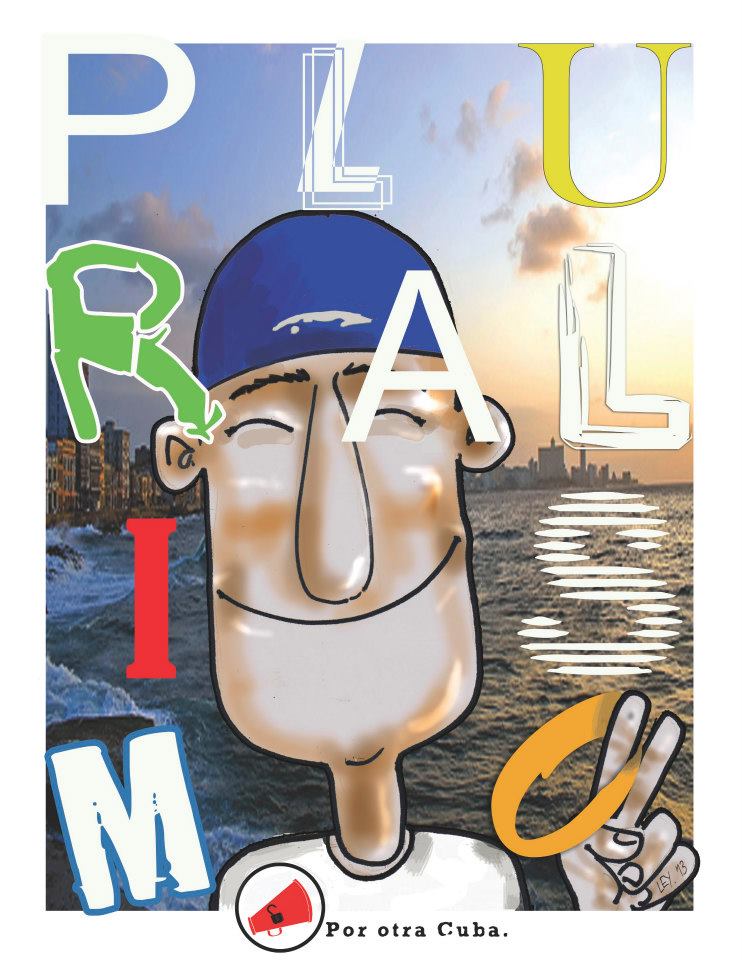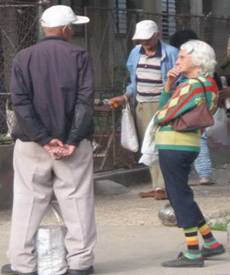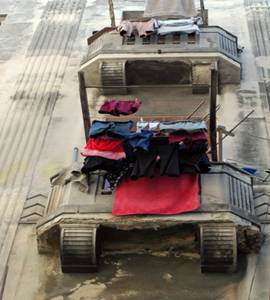No Pangs of Conscience / Yoani Sanchez
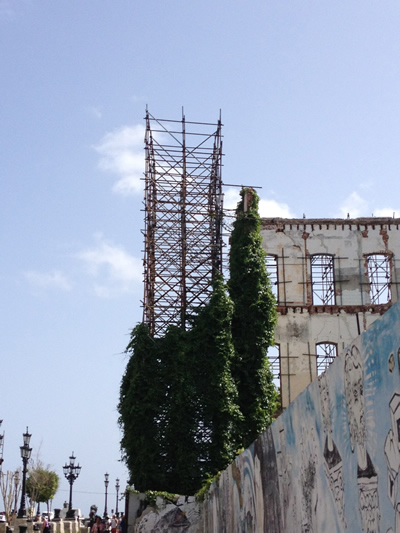 She has broken a nail in her agitation. Tomorrow she will have to go back to the manicurist to restore the nail polish and the miniature English flag painted there. His shirt is falling apart in the effort and his whole body is covered in sweat as if someone had thrown a bucket of water over him. No, it’s not an erotic scene, it’s not love, but lawlessness. A couple under the June sun carrying sand to finish remodeling their kitchen. They’ve stolen it from a theater that is being remodeled. Lurking until the custodian fell asleep after lunch. Then they filled two bags, which are enough to build a little counter. The little house has been built this way, taking a bit from here and there, hoping for someone to look the other way to carry off some bricks or floor tiles. Their little home has been the result of depredation, of this rapacity that so many Cubans assume towards the resources of the State. Take everything you can, grab anything from this powerful owner… and get it done.
She has broken a nail in her agitation. Tomorrow she will have to go back to the manicurist to restore the nail polish and the miniature English flag painted there. His shirt is falling apart in the effort and his whole body is covered in sweat as if someone had thrown a bucket of water over him. No, it’s not an erotic scene, it’s not love, but lawlessness. A couple under the June sun carrying sand to finish remodeling their kitchen. They’ve stolen it from a theater that is being remodeled. Lurking until the custodian fell asleep after lunch. Then they filled two bags, which are enough to build a little counter. The little house has been built this way, taking a bit from here and there, hoping for someone to look the other way to carry off some bricks or floor tiles. Their little home has been the result of depredation, of this rapacity that so many Cubans assume towards the resources of the State. Take everything you can, grab anything from this powerful owner… and get it done.
Among the reasons some buildings take so long to build or repair are not only apathy and lack of efficiency. The theft of cement, steel and other construction materials also slows down many public works. Some are already memorable, where the amount of resources stolen increases the initial costs of the building or restoration by a factor of three. The sinks disappear even before they come off the truck, the paint cans are filled with water to resell the paint on the black market, and there is even a hotel where 36 air conditioners were stolen a few days before its opening. Faced with so many thefts, each object and resource must be closely watched and the watchers watched in turn.
Many eyes are waiting for a slip-up. In one uncontrolled early morning a mound of gravel was reduced by a third. On some summer vacations, a school without a custodian could lose several windows and the occasional toilet. The light fixtures disappear, the electrical switches are ripped out and the looting extends also to the door handles, the stair railings, and even the ceiling tiles. With no pangs of conscience or guilt complexes on the part of the perpetrators. It’s more like the exploited poor taking a piece of the boss’s delicious snack when he’s distracted looking out the window. It is symptomatic that almost all those who take building materials from State construction projects feel no remorse for doing so. They call it “recovering,” “inventing,” “struggling,” “surviving,” When standing in a shower built with stolen tiles, under the running water they think, “you take what they give you and what they don’t give you… too.”
25 June 2013
Support Requested for “El Critico”: Imprisoned Rapper
From “Pieces of the Island“:

Yudisbel Roseyo Mojena, wife of dissident rapper and political prisoner Angel Yunier Remon Arzuaga “El Critico”, has been passing through some very difficult moments during these three months in which her husband has been behind bars. She has had to raise their newborn child (only 4 months old) on her own, while she has had to go through countless difficulties to try and visit Remon Arzuaga in Las Mangas Prison of Bayamo.
The musician was violently arrested by the political police on the 26th of March because he handed out pro-freedom pamphlets, painted anti-regime messages outside his home and carried out a public discourse in favor of human rights. Friends have also assured that Remon’s protest music within the hip-hop duo Los Hijos Que Nadie Quiso (The Unwanted Children) is another of the reasons why he has been taken to prison, considering that his music has attracted much attention from locals, especially the youth.
Inside of Las Mangas Prison, El Critico has been confronting numerous complications.
“Right now, Angel Yunier is not receiving medical attention although he suffers from an ulcer and chronic gastritis“, explains Yudisbel to this blog, “his jailers are also refusing to grant him minutes of phone access which he is supposed to receive“.
In addition, the young mother denounces that when she travels to the prison to visit her husband, “State Security always forms a problem. Each time I visit him it’s a different scenario. Sometimes they say they can’t bring him out at that moment, other times they tell me I have to leave first, etc“.
Please read the rest of the story here.
25 June 2013
Consciousness Asleep / Fernando Damaso
One of the main sources of my posts is the newspaper Granma, not only for what it says, but also how it says it and for what it doesn’t say. Although sometimes it publishes this or that interesting letter, the Letters to the Editor section from last Friday was priceless: either everyone who wrote supports the “Cuban model,” or they only publish this type of letter.
A reader, after pondering the existence of this section, and linking it with objectives 70 and 71 of the guidelines (which couldn’t be ignored), and also with 16, without adding anything new, finished in slogan-style, with the official sentiment: Our worst enemy is our own mistakes.
A fancier defends the breeding of carrier pigeons and ornamental pouter pigeons by the members of the respective federation and association, and denounces the so-called pigeon-raisers who profit off them, making it clear that the Pigeon Fanciers Federation gives its unconditional support to the Revolution. I think this assertion does not include the opinion of the pigeons themselves.
Another reader complains that in a town he visited, there has been no water for three months because the engine that supplies it is broken, and explains that all the measures taken by the authorities to solve the problem have been unsuccessful. He complains about the charge of 50 Cuban pesos for every water delivery and adds that he understands that the blockade, the hard work of the leaders, etc. has prevented a solution to the problem, and ends with the same slogan as the previous writer, that this Revolution can only be destroyed by ourselves.
A hothead, shield raised high, states that each patient should be informed about how much their treatment costs the State, forgetting that the State, with what it doesn’t pay citizens in their penurious wages, has many more financial resources at its disposal to distribute to the services of health and education.
Despite its small size, this sample demonstrates how low the level of public awareness still is, and how much we have to advance to be able to have a true civil society.
19 June 2013
The Business of Exporting Cuban Doctors / Ivan Garcia
By 1998 Fernando had already spent a year and a half working for free in the civil war in Angola where, to get to a clinic in an isolated hamlet, he had to be accompanied by a landmine deactivation expert. Twenty-five years later he is packing his bags for Venezuela.
This time there is no war. The government of General Raul Castro has turned Cuban medicine into the country’s premier export industry. It is a profitable business. Doctors are to Cuba what petroleum is to Venezuela.
According to figures from the National Office of Statistics and Information (ONEI), in 2011 the depleted state coffers took in around five billion dollars just in the exchange of Cuban doctors for Venezuelan oil.
In 2003 the government of the late Hugo Chavez reached an agreement in which PDSVA, the state oil company, would send 105,000 barrels of oil a day to Cuba for which Havana would pay by sending doctors, sports trainers and military advisers to Venezuela.
When Fernando, a medical specialist, travelled in an Ilyushin Il-62 jet to lend his services in the Angolan jungle, Fidel Castro’s official rhetoric was quite different. Money did not matter. In speeches he reiterated that he was motivated only by altruism and ideological solidarity, known as “proletarian internationalism.”
The Cuban regime did not begin charging for medical services until after 1991, the year Soviet communism said goodbye. Cut off from the wealth of rubles, petroleum and raw materials coming from Moscow, Cuba entered a period of unending economic crisis.
The Soviet Union defrayed the cost of the island’s military expenditures. A phone call to the Kremlin was all that was needed to obtain financial credits. Subversion was not Fidel Castro’s only tool for exporting his brand of revolution. On any given day he might use funds from the national budget to build a school in Kingston, Jamaica or to provide a sugar mill to Nicaragua.
It did not matter; the money was not coming out of his pocket book. But with the precipitous fall of the Berlin Wall and the disappearance of the Soviet Union, subsidized Cuba had to adapt to changing times.
Exports fell 40%. Sugar production some 70%. There was only tourism, which generated somewhat more than two billion dollars annually. And family remittances, which with hard currency, packages from overseas and cash spent by Cuban Americans on trips to the island amounted to almost five billion dollars a year.
But what contributed the most green-backs to GDP was the export of services. Not all the statistics are readily available but Carlos, an economist, believes that “just in terms of the services provided to the ALBA countries (Venezuela, Ecuador, Bolivia and Nicaragua) the figure approaches ten billion dollars annually.
It is estimated that currently some 40,000 doctors, specialists, nurses, technicians and others are working in sixty countries on five continents. Schools of medicine at Cuban universities graduate as many as 5,000 physicians annually. It is an assembly line, a highly profitable one.
Most of them are paid between two thousand and three thousand dollars a month, though some nations such as South Africa pay twice that. The regime retains 95% of their salaries.
Recently, Brazil announced it had agreed to hire about six million Cubans to work in the country’s depressed, rural areas. In a statement Brazil’s Federal Medical Council branded the agreement as “irresponsible and questioned the “technical and ethical quality” of the Cuban professionals.
After Brazil’s physicians exerted pressure, the government of Dilma Rousseff instead decided to hire Spanish and Portuguese doctors, whom it considered to be more qualified.
Cuba’s medical system does not enjoy good health but, so far, this situation is not reflected in the country’s favorable statistics. The average lifespan is 78 years. In 2012 the rate of infant mortality was 4.6 deaths for every thousand live births, the lowest in the Americas.
However, many hospitals are in ruins, their equipment in poor condition and their personnel mediocre. The mass exportation of doctors provokes unease among Cubans. Oneida, a housewife, says that specialists are rare. “At the clinic where I go, the dermatology department is open only one day a week due to a shortage of dermatologists. No hospital in Havana has a staff of dermatologists on duty. Those who treat you are foreign students and their quality leaves something to be desired. Most of the trained physicians are on ’missions’ (working overseas).”
According to the Brazilian Medical Council 94% of Cuban medical school graduates who took Brazil’s medical licensing exam in 2012 failed.
More than 5,000 Cuban doctors have deserted the international medical missions. Due to a lack of rigorous training for many of Cuba’s medical professionals, some doctors and specialists who decide to leave their homeland opt to work as medical assistants and nurses in the United States.
“Acquiring an American medical license is an arduous task. The exams are very rigorous. Once you live here, you realize there are a lot of gaps in our medical training. For me it’s not bad. While I am learning English, I work in a private clinic as a nurse. It pays well,” admits Eduardo, who has lived in Miami for two years.
Fernando, the doctor who 25 years ago was stationed in Angola, acknowledges that quality these days is not the best. “The reasons vary. From not having immediate access to specialized information, in spite of the national network Infomed, to low salaries and lack of technology. But I don’t think that the world is full doctors willing to work for two years in remote locations for subsistence wages.”
In 2012 sixty-eight Cuban doctors died in Venezuela. The Chavez government memorialized them, unveiling a plaque in their honor. “To heath care workers killed in Bolivarian lands while carrying out their duty,” reads the bronze inscription in a Caracas hospital, as though they fell in combat. Most were killed in street violence, which last year alone claimed 12,000 lives in that country.
“Then why are you going,” I ask Fernando.
“It’s the only way to acquire hard currency — performing abortions, doing small-scale business transactions and saving what little money they pay you — so that, when you go back home, you can fix-up your house and provide a better living for yourself and your family,” he says.
Some doctors with whom I spoke said it was economic necessity and not altruism that was leading them to work in out-of-the-way and dangerous locations, even at the risk of losing their lives.
Iván García
19 June 2013
Paradise for Cats / Rebeca Monzo
I’m not addicted to television, I’m not even an assiduous spectator of the small screen. Rather, I have a kind of monitor, to see the shows, almost all American of course, that I rent at a video stand. The only channel where I sometimes see interesting programs, “all canned” and “by chance made in USA,” is channel 33 which still, thank God, has not been ideologically contaminated.
Just a couple of days ago, in the morning, I was looking for a program that interests me but that I never see because of the schedule, at that time I’m just finishing breakfast, I lock myself in my workshop to listen to music and do some work until 11:00 in the morning, the time I go to the kitchen to “invent” our daily dish. By change I put on an old channel and fell in love with some beautiful cats who just then were being shown on the screen. The program grabbed me and I watched to the end, leaving me an immense desire to go tot Key West, or Cayo Hueso as we call it in Cuba.
I’m a cat person, I confess, I love all animals, except cockroaches and black moths (tataguas), but I have a special weakness for domestic cats. In fact I have two and feed a third. Usually I succumb before their sweet gaze.
The program in question was about the life of these animals in this little paradise, where there is a ratio of four cats per person and not all of them necessarily live in houses: some are shared with humans in hotels and restaurants. All are well fed and receive veterinary care. Some are operated to control reproduction. But what caught my attention, as I am a reader and admirer of Hemingway, is the care and devotion they give to the descendants of his beloved cats,in what was one of his most important residences.
I was captivated by those with six toes, with the effort and dedication to maintain their race and especially with how healthy they look. I think that if I ever visit this beautiful key, where in addition is nicely marked the area closest to our country, “the famous 90 miles,” it will cost me a great deal of effort to resist the temptation to get myself one of these beautiful animals.
Hopefully some day the culture in our country will also contemplate the care of animals and plants, and be known not just for its concerts and ballets. Of course, to get there they would first have to restore all the individual rights and free will of its citizens, lost during these more than fifty years.
23 June 2013
Discrimination in Accessing Justice / Lilianne Ruiz
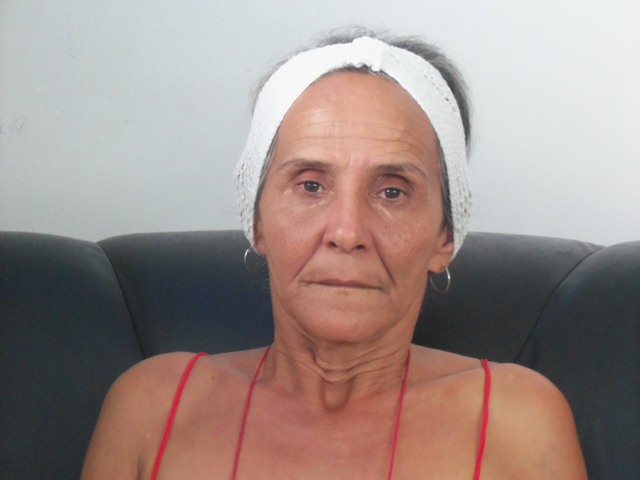
“Are you going to tell me that the State has more rights over my grandchildren than I do, I who have raised them since they were born?” was the response of Reina Ruiz Perez to the prosecutor, the day she tried to make her case for adoption before the Havana Provincial Court.
Later, frustrated by the neglect, she warned the representative of authority of her desire to undertake a public protest and ended up detained for the umpteenth time in her life.
The prosecutor had suggested that “after the death of the mother, custody goes to the father. If the father doesn’t want them, (the children) go to the State.”
In 2010, after the death of her daughter, this grandmother started to sue for legal custody of her grandchildren; the fathers of both minors have to objection at all in ceding custody to the maternal grandmother, and in practice don’t take care of them.”
“The children have been living with me since they were born, but there are no legal procedures I can undertake to bring it formalize it,” said Ruiz Perez.
The Cuban courts “have denied (the grandmother) access to justice,” Cubalex attorney Laritza Diversent points out, when consulted on the matter. “In Cuba adoption is processed through a record of voluntary jurisdiction; this means it’s a matter of particular interest. In these cases the procedural law authorized going forward without legal representation. In other words, the grandmothers are legally authorized to adopt their grandchildren.”
Ruiz Perez also tells us that since the ’90s, when she became active in the non-violent opposition to the Cuban dictatorship, she has faced great abuse, which has included being imprisoned without a trial in the women’s prison known as “Manto Negro” (Black Robe); along with innumerable detentions in Police Stations to try to block her protest activities. Many of these arrests occurred within sight of her three children, and at least once she was taken the Police Station with her youngest daughter in tow.
“I went to the Calabazar Station up to four times a week,” the grandmother reports. “Once they locked me up in the Station Chief’s office with my youngest daughter, until the official ’in charge of minors’ came looking for the Station Chief. When she opened the door and saw the girl sleeping in my lap, she was shocked because it wasn’t even 8:00 in the morning, which betrayed that we had spent the night locked up there.”
With a long history of harassment and political persecution, at age 53 Reina Ruiz Perez has obtained a visa to live as a refugee in the United States. The problem lies in the fact that the Cuban State, so far, has not allowed her to take assume legal representation for her grandchildren. In practice, she has been the only one who has taken on the care of the minors, who have lived in her house since they were born, where they get a pension — their mother having been a State worker — which amounts to 100 Cuban pesos per child (the equivalent of $4.00 USD a month).
This legal impediment means that the children haven’t been able to obtain the documentation to travel with her to the United States.
After hiring a lawyer Ruiz Perez was not able to complete the adoption; as it says in the case file, “The process contracted on 29 August 2012 was shelved indefinitely.” Later, following the recommendations offered by Cubalex — the legal information center — covered in the articles of the law that authorize it, she presented a brief to the Court to activate the adoption proceedings herself, but the Court refused to recognize the procedure.
The last time State Security visited Mrs. Ruiz Perez, the agents who presented themselves as “from Immigration” expressed “concern” for the situation of the children, and argued that it wasn’t the Cuban government that was “holding things up,” but “your American government that doesn’t want to give them the visa.”
But it’s not only the political police that has expressed that argument.
According to what is also stated in the case file, the president of the Boyeros Court “treated Ruiz Perez disrespectfully” and said that “it is the fault of the American that they aren’t allowed to leave, not the president of the Court’s, and that there no adoption is accepted.”
One wonders what is the objective of refusing the grandmother in question the ability to complete the adoption as established.
In maintaining this situation the Cuban State is violating the Convention of the Rights of the Child, which demands that the best interest of the children always be considered.
21 June 2013
Havananess and NewYorkitis / Regina Coyula
Not very productive on the blog, I’ve dedicated time to a course on editing with Adobe CS6 including editing work, extremely interesting; I read The City and the Dogs (I much prefer the young Vargas Llosa to the famous one); I have put in order the drawers and closets; and have prepared work in one of my favorite pastimes, my violon d’Ingres no doubt, but the sewing and crafts I love. Without internet, I can only translate Telesur, which focuses too much on Venezuela, as if the most important events happen there; it must be the “he who pays,” and well, you already know who the majority shareholders are of that broadcaster.
I watched excerpts of the recent Federation of University Students (FEU) congress which depressed me. Even though I know that those kids are chosen for their discourse (note I don’t say for their ideology, because I doubt they all say what they think), the speeches I saw didn’t refer to the students or their rights, nor to the university environment; it was all about struggle, battles, enemies, campaigns for the release of the “Five Heroes,” all in similar language, with similar gestures, until I think they clone them, because they were dressed alike, they couldn’t have reflected better the anodyne or innocuous. I hope, not that they change their ideology if they are sincere, but that they try to shake off the image of mediocrity they convey.
I continue with the mundane world. I enjoyed Pestano’s homerun at the end of the game, the dream of any player, a homerun with the bases loaded. He should have dedicated it to Victor Mesa, who left him off the national team. I enjoyed the final of the under-twenty soccer, and enjoyed the Confederations Cup. Spain is in crisis but their soccer is first class.
What else? I went to bed at dawn on Tuesday because of Dirty Sexy Money. It’s funny how the political discourse goes in one direction and the TV is full of pirated series that say the opposite. And they say it better. If we did a meta-analysis on the series, we could say it’s an acid critique of social decadence because of money and power, but it must be very profound because what we see is a fast-paced plot, well acted, well set, with the addition in my case of being in New York.
And I say, if the Muslims have to go to Mecca once in their lives, I have to go once to MOMA, pass through the door of the Met, eat a hot dog in Central Park, and take the corresponding tourist photos of the Flatiron and Chrysler buildings and Times Square. Meanwhile, I conjure up my NewYorkitis with canned enemies.
21 June 2013
Prison Diary XXIX: Censorship in Prison / Angel Santiesteban
You could not imagine the artifices and movements required to get a complaint, a post, a letter where you say what you want to your family or friends about what you feel or what happens in prison, out of prison, without its being seized.
All the documents that leave or enter the prison have to pass by the eyes of the Re-education officer.
Thursday mornings the correspondence is collected, and from then until Friday afternoon, it passes through several readings by the censors, who do or don’t approve it.
This also occurs in reverse, families send letters, and after being read with great care the inmate receives them.
It’s unnecessary to clarify that in my particular case the control measures are redoubled.
Last week my family heard nothing from me, because the officer took the correspondence without noticing, according to what the Re-educator told me.
In any event, I look for alternative ways to get my complaints on the Internet, bypassing the various levels of obstacles.
It’s worth nothing that the common prisoners lend their help in this communication bridge, motivated by the dream of a political change, as well as anger awakened by the guards with their excesses and blackmail.
It’s like a cat and mouse game to get the complaint to its destination, because to avoid them they resort to any unprincipled trick. There are prisoners who earn perks not to let me out of their sight, attentive to every detail.
They have ordered their collaborators to inform on the names of everyone who associates with me. In recent days they have removed five inmates, accusing them of collaborating with me. They are taken to different barracks or other prisons, sometimes located in distant provinces.
To talk on the phone I have to wait for my dat each week, and carefully plan the three minutes allowed, because the clock that calculates the time measures it whether or not you manage to communicate, without any margin.
But every victory, no matter how small, is a pleasure. Of course they hid me away in the this maximum security prison to limit my connection to the outside, another attempt by the Castro brothers’ Government to silence my voice.
One day we will publicly thank those people who have risked their tranquility in prison so that the world will know the horrors that are committed in the prisons of the Castro dictatorship.
Finally, my thanks to State Security’s military prisons which have held me here, allowing me to be a witness to the daily abuses that happen in Cuban prisons before the complicit eyes of those who direct the destinies of the Island; what happens within the Guantanamo Naval Base, as described in the official discourse of complaint, can’t hold a candle to what happens in Cuba’s own prisons.
They should see the level of impunity with which the Cuban government acts.
Ángel Santiesteban-Prats
Prison 1580. May 2013
Posted 18 June 2013
Throwing Out the Sofa / Rebeca Monzo
Again, the education sector is marred by scandal: the theft and sale of the questions for the eleventh grade exams. Apparently all or most of the municipalities of Havana are involved in this crime.
It is not the first time this has happened, and the media haven’t reported it. As usual, the news comes through the students and their parents, close to us, almost always neighbors, who have been affected by these events.
There have been meetings between the teachers and the parents of the students involved in the various schools, and the approach of the teaching profession, in my view, is not the most correct, and far from effective: “Don’t give your children so they can’t buy the exams.” This reminds me of the famous story of the cuckolded husband who comes home and sees his wife snuggling on the sofa with her lover and, enraged, decides to throw out the sofa.
Once more, they want to suppress the effects without deeply analyzing the causes. This has been happening in our schools for many years. It’s not news to anyone, but the State continues to pretend that does not happen, and continues to offer very favorable statistical figures to United Nations whose officials disseminate the information without taking the effort to verify it.
It is more or less the same policy used by public employees in our country: “The State pretends to pay me and I pretend to work.”
As long as the Ministry of Education does not decide to end this fraud once and for all and demand accountability at all levels, this situation will repeat itself and the quality and prestige of education in Cuba will continue to decrease.
According to popular comments, too widespread not to be true, even the University hasn’t escapes this scandal. It is said that they have been forced to send the entrance exams under guard by the TrasVal (“transfer of values”) Company, which until recently was used, as its name implies, to guard considerable sums of money and other things of value.
If we “throw out the sofa”* and don’t denounce these irregularities and crimes, we would be contributing with our silence even more to the “downward spiral” into the abyss, to something as important and precious as education and its prestige. We remember that mistakes in this sector are paid for over the long-term, when there is virtually no solution.
*Translator’s note: A common Cuban expression that comes from the following joke: A man comes home to find his wife and her lover having sex on the sofa. Enraged, he throws the sofa out the window.
21 June 2013
LGBT L for Liberty / Rolando Pulido
Prison Diary XXX: Internet in Cuba / Angel Santiesteban
The Cuban government announces Internet connection points around the country, proving that the cable extending from Venezuela, which was the pretext for justifying out exile from browsing the digital networks, is working in the nation. They say, however, that it has not yet been approved for use in Cuban households thus maintaining the iron surveillance of the dictatorship.
With an exorbitant price for Cubans, those who earn the highest salaries would have to work about five days to consume one hour of connection, ie the best paid may consume five hours a month, but this would not allow them to also feed or clean themselves, and they would have to pray to have no dependents to maintain.
The “points” indicated, according to official information, will be the Youth Clubs, which belong to the leadership of the Young Communists, and it will be a way to announce to the world that in Cuba the population “has” internet.
When I heard the news that an hour of connection would cost 4.50 CUC, just over 110.00 Cuban pesos, which is the currency that is paid to the people who sweat, I did the calculation below: a midlevel teacher would have to work seven days just to hear from his family abroad, because reading news would be impossible treat to give yourself.
As the government does not solve nor interest itself in social problems, and we know this through each measure it dictates, it is not hard to convince oneself that it’s looking to get nationals out of the hotel internet rooms and away from tourists, and to some extent to limit the protection of dissidents who, in the majority of cases, are not arrested in tourist areas so as not to damage even further the tarnished image that the regime has earned abroad.
Now from the Youth Clubs, located in the city slums, they can pursue, monitor and suppress the footsteps of those who dare to criticize the government and demand Human Rights; and in passing they will alter their figures, as they often do, and will tell the Human Rights Commission in Geneva that the internet is free and available to those who need it; what they won’t say is that for the average citizen, the use of it will be an act of science fiction.
21 June 2013
Internet in Cuba: What Iroel Sanchez Didn’t Say to Telesur / Jeovany Vega
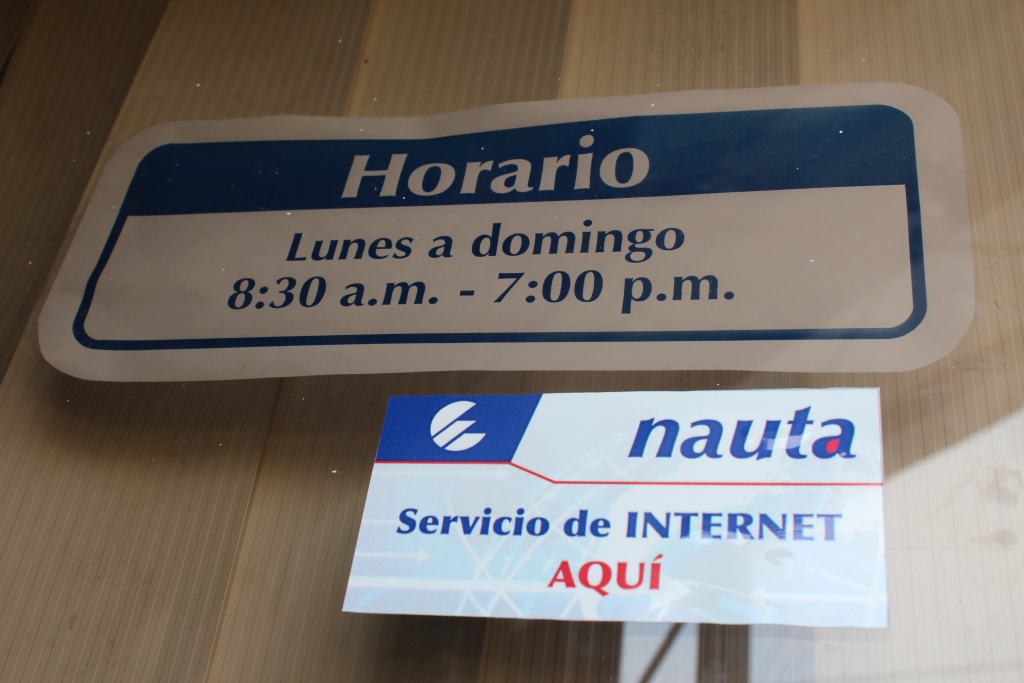
Last Wednesday June 5th, at the end of the Telesur programme “Today’s Themes”, our brilliant journalist Iroel Sánchez commented about the “novelty” of the rooms enabling “free” Internet surfing throughout Cuba. That more than two decades after the Internet became a daily portal for the rest of the world it is even announced in Cuba, with fireworks, that from 118 timid locations in this country of more than 12 million inhabitants will be able to surf “freely”, says it all.
But there are various angles of the issue that Iroel didn’t comment about on Telesur: he didn’t mention the little detail that he himself has had free complete access to the Internet, because it is among the privileges of “official” reporters to access the network from their offices or comfortably from their homes *and* it will be like that as long as he doesn’t transgress the line of the Rubicon, while Caesar, attentive and scowling, calculates every byte.
Iroel didn’t say that in our case, the connection time is dependent exclusively on the times ETECSA offices are open (from 8:30AM to 7:00PM) in rooms in which between 2 and 6 machines are available — for example in Artemisa, a provincial capital of 800,000 inhabitants, one can only find two — and these tiny pieces wouldn’t be enough if they had conceived of a reasonable price and not an absurd and crazily extorsive one.
He didn’t say that at 4.50 CUC — which is the same as 112.00 Cuba pesos or equal to a third of the average worker’s monthly wages — which would be the same as the charging the average Spaniard 250 Euros for an hour of surfing, but with the additional aggravation in the case of Cuba of living in the most expensive country in the world.
Iroel Sanchez forgot all of these details when he was being interviewed by Telesur.
Meanwhile, this is how I see it: if the Cuban government says it is telling the truth, then why is it so terrified of an exchange of ideas? Because only information, pure ideas, translated into the most simple binary code, can enter the country along an optical cable, and never bombs or rifles. I have the conviction that all the truth, in its natural clarity, is as firm as a rock and can defend itself by its simple presence beneath the sun, for which reason I will never understand why they are depriving my people of something as basic as free access to the knowledge contained in cyberspace.
At times when my country talks about the prospects of transformation, which they are begging for, and on which the government timidly feels its way forward, while the society pleads for faster progress in the changes which sometimes seem more cosmetic than real, at times like that, this is what we get.
I have always said that I prefer a despot to a cynic because the former mocks you to your face, doesn’t hide his natural tyranny, and shows his true colours: yes, I abused you — so what? But the latter, evil at heart, tries to insult your intelligence. Because to claim that such stratospheric charges are affordable by the people, is equivalent to saying that so are the hotels which charge $300 per person — a year’s wages — for one miserable weekend.
Now they are trying to export the illusion that now we Cubans are living happily connected with the world, but they must know that this is a masquerade, as is demonstrated by the empty seats in these embarrassing locations. The Cuban people are awaiting and insisting on real, free, effective and total access to the internet, by way of reasonable contractual terms appropriate to what they can afford and which allow them to explore the virtual world, when they want and full-time.
I want internet in my home in order to explore all truths and weigh them up them against my own … like Iroel Sánchez but with the difference that I want to have it as a right which I am exercising, and never as an improper privilege. For me that would be the measure that would tell me that finally we are on the path to real changes; as long as we can’t depend upon absolutely free access to the internet everything will be imitation gold and pure fantasy … just a fairy tale.
By Jeovany Jimenez Vega
Translated by GH
10 June 2013
My Patriotic Papito Who Rests in Peace / Orlando Luis Pardo Lazo
My papá never saw the United States in person. But he spoke of this country with idolatry. I suspect papá was a natural annexationist.
His patriotism did not believe in the good will of the nation, and thus aspired to save the Cuban people from some historical horror. Papá bet on the Law, but — and this he experienced in his own flesh, then, and now in the flesh of his flesh which in some small part is me — he sensed that the law in Cuban is a noose that Cubans put around the necks of Cubans.
In the Republic or the Revolution (Papá was born on April 8, 1919, a year that I love as much as mine: 1971), that gentle man with green eyes and parents who were cousins in Cudillero, Asturias, collected commercial information about the United States. Magazines from the fifties, pocket-books stolen from the National Library, letters and accounting tomes, and a thousand little things from his family exiled so quickly that even another son he lost, in 1962, Manolito Pardo Jr., who wrote to us from Miami until my father died on August 13, 2000, eaten up by undiagnosed cancer but without the slightest wince.
One had to hear how my father said, at breakfast time, after coffee with milk in the wooden house in Lawton,, and before lighting the first cigarette of the universe: “The United States…”
He was called Dionisio Manuel. And he was my papá.
Today the United States is a wasteland for me.
And not just for me.
If you don’t have someone to give a nicotine-smelling hug at dawn, if there is no one to fight with over his radical democrat nonsense, if disease took away his belly and then his son’s heart (he didn’t pay attention to it when he asked me on his deathbed to be quiet until the last of the criminals of Castros’ Cuba died of old age), if a simple or battery-operated Father’s Day postcard does not have any meaning to you, then all the fathers in the universe are missing from our souls.
I’m sorry for those who can still be comforted.
I can’t. Nor can many others.
Not to mention, me, I don’t want to.
The memory of death is our best talisman.
15 June 2013
Neighborhood Decline / Rebeca Monzo
Much has been written about the deterioration of Havana and other cities throughout the width and breadth of the country, and I can assure you that nothing has been exaggerated. One need only to take a quick stroll through any Havana neighborhood such as such as Víbora, Santo Suárez, Casino Deportivo, Fontanar, Altahabana, Nuevo Vedado, to name but a few — neighborhoods which had previously been occupied largely by working, middle and upper class families, by professionals and by radio and TV personalities — to witness the rampant decay.
Early in the morning, in the entryways of every residence, one used to be able to see bottles of milk, bread hanging from grillwork or placed on a windowsill, and newspapers. It was just part of the everyday scene. It never occurred to anyone to violate the privacy of those homes by taking one of those items, even though they were so close-at-hand.
Property owners, pressured by the impact and scourge of the drastic changes which occurred in 1959, decided to leave the country and, thus, had to abandon their homes. These houses, often completely furnished, were “handed over” to the “new occupants,” who had no prior relationship to the properties and had sacrificed nothing in their construction.
As a result the social make-up of the neighborhoods began to change and with it their physical characteristics. Therefore, it should come as no surprise that in any given area one has to put up with music from audio systems turned to full volume, vulgar shouting and language from people screaming “at the top of their lungs,” trespassing through gardens as well as men and boys brazenly leaning against walls or entering buildings to urinate in full view, even in the bright light of day. Then there are the candy wrappers, empty packaging, soft drink cans and other refuse which, because of the absence of trash cans at curbs, are thrown carelessly into the middle public thoroughfares.
And that is not the worst of it. There are things more terrible that wound the sensibilities and provide extremely unpleasant spectacles that can be observed or overheard by anyone, even children. These include animal sacrifices performed in public or within view or earshot of neighbors and intended as an “offering to the deities” in the hopes of “helping to solve a problem.” One of these was recently carried out in the patio of a house here in the middle of Nuevo Vedado for a neighbor who is under investigation for the crime of embezzling public resources. There are also the tiresome “drumming sessions” that sometimes last till dawn.
I certainly agree that everyone should be allowed to profess his or her religion as he or she sees fit; that is a basic human right. But I do not agree that the practice of rituals and ceremonies should be allowed to disrupt the tranquility and order of a neighborhood. And I categorically disagree with the indiscriminate slaughter and torture of animals for these or any other reasons. When it comes to the sacrifice of animals for human consumption, day by day the civilized world looks for ever better methods that might reduce their suffering to a minimum.
I watch with sadness as day by day this beautiful city continues to lose the beauty for it was previously famous, as it is made ugly by uncontrolled architectural alterations and social behaviors that are unrelated to the traditions, unique architecture and good customs of the past — those things that allowed for harmonious co-existence.
18 June 2013
